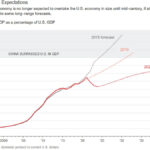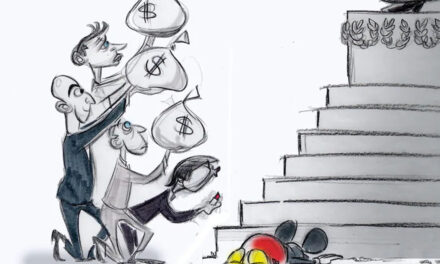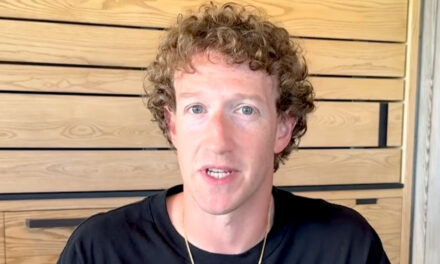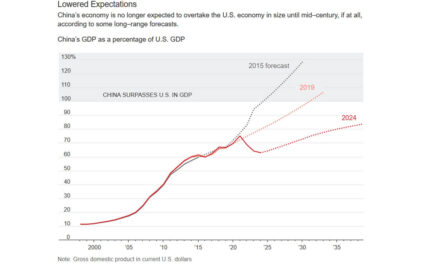
HORIST: Is the future as fearsome as we fear?
Now that we are temporarily past the high point of the superficial pugilism of our political process – or maybe just about to enter a new and more terrible phase — it is a good time to get philosophic about our future – not your and my personal futures and not even the political future, but the future of humanity over the longer haul. It could make current political events seem a lot less important.
Why look down the road so far?
The contemplative futurist in me comes from the fact that my clients have included several true geniuses in various disciplines, including a couple of Nobel Prize winners – one in physics and one in economics. There were others who could be Nobel Prize winners – one in genetics and one in biology. And there was even a theologian, an urbanologist and an assortment of other deep thinkers. They each represented a piece of the future picture.
They might have come to me for advice – go figure – but I learned more from them than they ever learned from me. These were all people who could envision the future because it was already happening in their brains and in their laboratories – and sometimes before our very eyes.
We exist because we are needed
We humans exist because we are needed, whether it is the result of fateful astrophysics or a divine plan makes no difference. If we were not needed, there would be no labor, no economics, no progress. We are needed to discover and to improve whatever is within our grasp – and to constantly extend that grasp. We know that is true because that is what we do for a living. If we were not needed, we would not exist. Whew! That’s pretty heavy … eh?
One way to look at it is that we are indentured in the servitude of progress. It is what we do and what we talk about all the time. We marvel at all the ever-evolving technologies that have conquered diseases and taken us to the Moon.
The technological future
We carry a device that is humbly called a cell phone. Not only can we talk to people around the world while walking about, but we can explore the Internet, watch movies, pay for purchases, maintain our calendars, shop for goods and services, take pictures and videos, calculate our taxes, answer our home doorbell, listen to music, find our way to a distant location, monitor our heart or diabetic sugar levels in real time … and we can talk to it to get answers to the most obscure questions imaginable.
Like the Six Million Dollar Man of television fame, whose biological body was partially replaced by superhuman mechanical devices, we are all slipping into some level of cyborg-hood. My 87-year-old brother plays racquetball three times a week with two mechanical knees and a pacemaker.
Okay, so we can go on and on about the amazing accomplishments of humanity – especially in the past 150 years. But, what about the future? As much as we celebrate the progress we have accomplished, we are terrified of the future trends – and maybe we should be.
So, let’s look at some really scary stuff.
It is in our genes
In genetics, we now have the power to clone human beings – and there are those who say it has already been done secretly. Whether that is true or not is irrelevant. We can, and we most certainly will. Suddenly, a billion years of biological evolution is out the window. The female egg and the male sperm are no longer needed. Rather than raising a unique new person, a man or a woman could raise themselves.
Genetic engineering can change our very being. Rather than manage diseases with pharmaceuticals, we can eliminate them at the DNA level. AND even more scary, we can change physical traits.
Image an expectant couple going to the geneticist doctor and he gives them the DNA read out – the sex of the child, the eye color, hair color, skin tone, the shape of the ears and nose and the existence of even late-in-life diseases. Of course, all the diseases will be eliminated, but the couple would be able to “design” their child. Maybe the couple would like to have an Asian looking baby. No problem. Change the skin color, make the blond hair black, change the shape of the eyes. For the first time in human history. Those babies will not be the genetic offspring of their parents. A billion years of human evolution by natural selection will have ended.
We have already combined plant and insect DNA with animals, producing bunnies that glow from firefly DNA and a green pig tinted by the chlorophyll in plants. My geneticist client said it is theoretically possible to combine plant and human DNA so that people in equatorial regions could get up to 40 percent of the nutrition directly from the sun – and the DNA would be tweaked to remove the resultant green skin color. I really wish I was making this stuff up.
Body and soul … and Artificial Intelligence
In the past, there was a high correlation between our bodies and our minds. It was one package upon arrival and one package upon departure. Not so in the future. Our biological bodies are becoming less and less important. There is no end of science fiction movies in which a disembodied brain functions quite well in suspended liquid, using only stored intellect to manipulate a mechanical world – almost always to some evil purpose.
Artificial Intelligence (AI) goes even further. We saw hints of it when the computer HAL (a name chosen because each letter precedes I,B and M) took over the spaceship in the 1968 movie 2001: A Space Odyssey. As early as the 1920’s, a play by Czech writer Karel Čapek entitled Rossumovi Univerzální Roboti (Rossum’s Universal Robots for those who do not speak Czech) dealt with AI before there was AI. It is a story about robots that began to think – and feel – on their own in a world without people. Several science fiction movies have had humankind enslaved by a civilization made up of humanoid tin cans full of miniaturized electrical components. Almost 100 years later, we are on the cusp of that reality.
Living forever
What will life expectancy be in that future world – assuming we flesh and blood humans are still in it. There are some who theorize that if we are to continue to exist intellectually – if not biologically — our knowledge, our essence, will have been downloaded into less vulnerable machines – computers, of sorts. It is not exactly a brain in a beaker, but close.
Though no one has lived that long, today’s scientists judge the maximum life to be in the range of 150 years. The body just wears out. The closest to that mark was Jeanne Calment, a French woman who lived to be 122 years and 164 days old – surviving on high cholesterol Frank cuisine (the culture not the hot dog) and smoking both cigars and cigarettes until the age of 117. Talk about good genes.
Future genetic medicine will be able to grow a liver to replace a diseased one – and experiments on mice have shown that the telomeres attached to our DNA – the deterioration of which produces aging – can be repaired to actually reverse the effects of age.
Elimination of diseases, replacement body parts – biological and mechanical – and age reversal opens an astounding possibility. According to my geneticist friend, future generations may have unlimited life expectancies. Those future generations would think of Methuselah as having died young at the age of 969.
Robots taking our jobs
But what about that scary AI in terms of jobs? If machines (computers) can do everything, what happens to we humans? Remember, we exist because we are needed, but what happens if we are not needed. Do we just evolve out of existence? Do we hand over relevancy and progress to electronic circuits and mechanical moving parts? Billionaire industrialist Elon Musk is among those who believe we may be a species doomed to extinction like all those dinosaurs who ruled over the earth before we arrived.
But, what about the transition period while we slowly surrender the world to those infernal machines?
That conversation is being carried out today in the worlds of science, economics and politics. We are already seeing how robotics is replacing human labor. That fear of replacement has been expressed since the industrial revolution – but the dreaded outcome did not happen. In the past, new technologies changed the nature of jobs, but actually produced more of them. But, there is no certainty that the same will happen in the future. It is more likely AI will replace the need for human labor and all the new jobs will be turned over to … more machines.
That may seem like a dark outlook, but maybe not. In a future world without human labor, we biological folks may all be capitalists. Our productive “labor” may be investing in and owning the machines that do all the physical work. It would be a little bit like owning a horse. The horse does all the work necessary to produce wealth (income) for the owner. (Yeah, I know there are grooms, trainers and jockeys, but go with the analogy … okay?). We already have capitalists whose only labor is investing. In fact, many are high up on the Forbes’ magazine list of the richest folks in America.
There has been a television serious called “Life After People” which imagines a world without us. Of course, the world slowly deteriorates and returns to what we once knew as the prehistoric planet. All the achievements of mankind slowly disappear. The flora and the fauna of the earth take over everywhere. The human infrastructure crumbles.
But what if, in the future, all that progress we humans had made would go on uninterrupted in a world in which machines and AI are all that is needed. Think how much easier and safer it would be to send intelligent machines to Mars – and beyond. In such a world, we would not be needed, and if my proffered philosophy tying need to existence is correct, we will cease to exist – but progress would continue.
As my grandfather would often say, “Put that in your pipe and smoke it.”
So, there ‘tis.


























All shit. No bull. The only thing dangerous about you is the smell. You probably wouldn’t make it a week…
Joe Gilbertson: where are you going with these threats? My free speech is facing intimidation, sometimes physical threats. Is this…
NOT BUSTED. You didn't have to say it. That is what I meant in the above post from me. But…
Just another ruse for taking jabs at Biden through alleged short comings of his. Ten days remaining in Biden's term…
I never said I WANT China to continue to own Panama. You made that up. First,I didn’t say it. Second.…